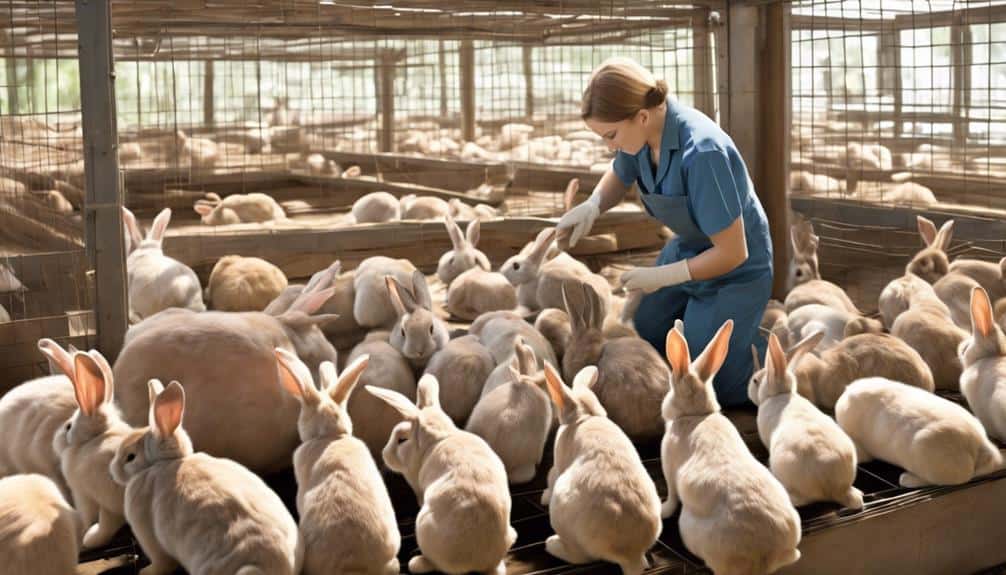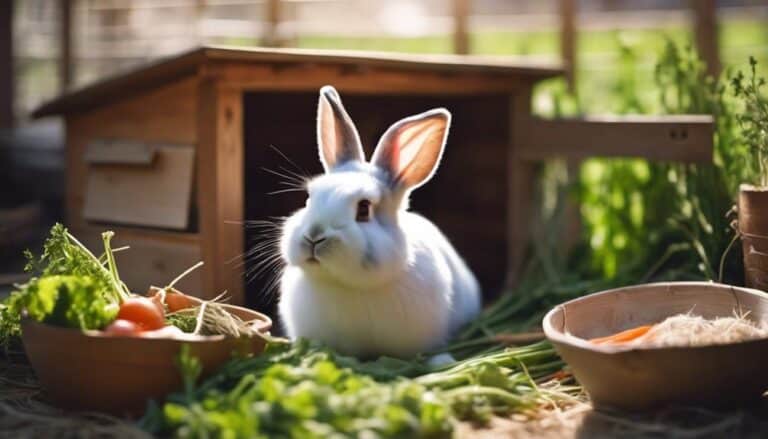Embarking on the ethical journey of bunny breeding beckons you to ponder on the paramount principles guiding this noble endeavor. As you navigate the complexities of ensuring the well-being of these fluffy companions, you'll find that key elements such as genetic diversity, responsible breeding practices, and a commitment to breed preservation play pivotal roles.
But, what exactly does it take to uphold these standards and navigate the ethical labyrinth of bunny breeding with grace and integrity? Stay tuned to uncover the fundamental keys that will open the door to ethical bunny breeding practices.
Contents
Key Takeaways
- Thorough research and education in genetics and health are essential for ethical bunny breeding.
- Providing a safe haven with proper care, space, and hygiene ensures rabbit well-being.
- Select healthy breeding rabbits based on genetics, health, and reproductive history for optimal offspring.
- Regular health checks, disease prevention, and breeding program planning are crucial for ethical bunny breeding.
Research and Education in Bunny Breeding

To excel in bunny breeding, immerse yourself in thorough research and education to grasp the nuances of genetics, health, and behavior important for successful breeding programs. Extensive research forms the foundation of ethical bunny breeding, allowing you to make informed decisions that positively impact the well-being of rabbits. Understanding genetics is key to producing healthy and strong offspring, ensuring the continuation of desirable traits in future generations.
By delving into rabbit anatomy and reproductive cycles, you gain insight into the intricate processes that govern successful breeding. This knowledge empowers you to navigate challenges with expertise and care. Education plays a critical role in honing your breeding skills, enabling you to create a safe and nurturing environment for your rabbits.
Prioritizing the health and behavior of your bunnies through research and education not only elevates your breeding programs but also contributes to the overall welfare of these adorable creatures. Embrace the journey of learning and discovery in bunny breeding to foster a compassionate and ethical approach.
Creating a Safe Rabbit Haven
Research and education in bunny breeding equip you with the necessary knowledge and skills to create a safe haven for your rabbits, ensuring their well-being and security at all times.
When it comes to ethical rabbit breeding, providing ample space is critical. Rabbits need room to move around freely and exhibit their natural behaviors. Guarantee proper ventilation in rabbit shelters to protect them from extreme weather conditions. Utilize secure enclosures or runs to prevent predator attacks and keep your rabbits safe.
Sturdy nesting boxes are essential for pregnant rabbits, creating a clean and comfortable environment for them and their kits. Maintain a clean living space by regularly cleaning cages and removing waste to promote the health and well-being of your rabbits.
Selecting Healthy Breeding Rabbits

When selecting healthy breeding rabbits, prioritize choosing individuals with strong genetics and a clean bill of health to guarantee the well-being of future litters. Here are some key points to take into account:
- Genetics: Opt for rabbits free from hereditary health issues to avoid passing on genetic diseases to offspring.
- Health Screenings: Confirm breeding rabbits have undergone health screenings to identify and prevent the transmission of genetic conditions.
- Desirable Traits: Select rabbits with good conformation, temperament, and a positive reproductive history to enhance the quality of future generations.
- Age and Vitality: Take into account the age, overall vitality, and reproductive history of breeding rabbits to maximize breeding success and ensure healthy offspring.
Health Care and Disease Prevention
Ensuring the health and well-being of your breeding rabbits is foundational to a successful and sustainable breeding program. As responsible breeders, conducting regular health checks is essential to prevent diseases and maintain overall well-being in your rabbits.
It's important to uphold a clean environment to prevent illnesses and promote good health among your rabbits. When introducing new arrivals, following quarantine procedures is crucial to prevent the spread of diseases within your rabbit population.
Monitoring the integration of new rabbits is key to preventing disease transmission and ensuring a healthy environment for all your rabbits. Disease prevention measures should be at the forefront of your breeding program to maintain a thriving and healthy rabbit community.
Planning Your Breeding Program

Craft a thorough breeding plan that clearly outlines your goals, objectives, and timelines for your rabbit breeding program.
To guarantee a successful and ethical bunny breeding program, follow these key steps:
- Selection Criteria: Carefully consider the selection criteria for breeding pairs, focusing on factors such as health, temperament, and conformation. This will help produce healthy offspring with desirable traits.
- Genetic Diversity: Implement strategies to maintain genetic diversity within your rabbit population. Preventing inbreeding is essential for the overall health and vitality of the breed.
- Monitor Breeding Outcomes: Regularly monitor and track breeding outcomes, including litter size, viability of offspring, and genetic traits passed down. This information can guide future breeding decisions.
- Seek Guidance: Don't hesitate to seek advice from experienced breeders or mentors. Their insights can help you refine your breeding plan, overcome challenges, and ultimately improve the quality of your breeding program.
Frequently Asked Questions
Is It Ethical to Breed Rabbits?
Breeding rabbits ethically involves considering welfare, genetics, and responsible ownership. Assure population control, prioritize health, and adhere to laws. By promoting ethical breeding practices, you contribute to a sustainable, positive community for bunnies.
How Do You Humanely Raise Rabbits?
To humanely raise rabbits, provide proper nutrition, safe handling, adequate shelter, socialization, mental stimulation, health care, exercise, breeding considerations, genetic diversity, and environmental enrichment. Remember, meeting these needs guarantees the well-being of your rabbits.
How Do You Successfully Breed Rabbits?
To successfully breed rabbits, you must master breeding techniques, prioritize genetic diversity, guarantee proper health care, meet housing requirements, understand reproductive cycles, select ideal breeding pairs, provide environmental enrichment, meet dietary needs, employ socialization methods, and practice gentle handling.
Is Raising Rabbits for Meat Ethical?
Raising rabbits for meat can be ethical by prioritizing animal welfare, sustainable practices, and consumer awareness. Ensuring health benefits, genetic diversity, and environmental impact are crucial. Compliance with regulations, reflecting cultural beliefs, and ethical considerations are essential.
Conclusion
Congratulations on taking the first steps towards ethical bunny breeding. Remember, Rome wasn't built in a day, so take your time to learn, grow, and improve your breeding practices.
With dedication and care, you'll soon be on your way to creating a bunny haven that any rabbit would be proud to call home. Keep your eyes on the prize, and remember that slow and steady wins the race.
Happy breeding!






